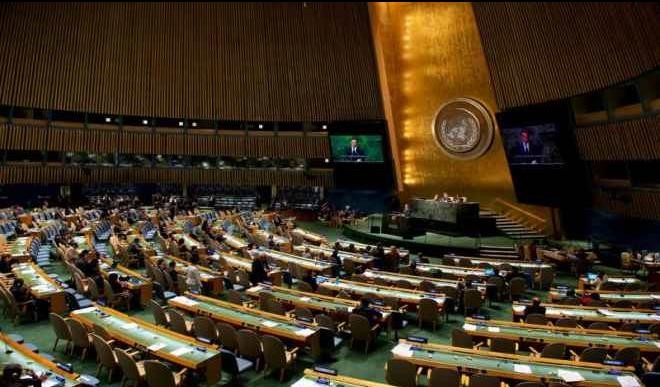72nd UNGA: ‘Addressing climate change in Nigeria not simple task’
Addressing climate change within the overall development challenges of a developing nation like Nigeria is no simple task, the Minister of State for Environment, Ibrahim Usman Jibril, has said. Jibril who stated this at the ongoing 72nd United Nations General Assembly (UNGA) in New York, during the meeting of the Committee of African Heads of […]


Addressing climate change within the overall development challenges of a developing nation like Nigeria is no simple task, the Minister of State for Environment, Ibrahim Usman Jibril, has said.
Jibril who stated this at the ongoing 72nd United Nations General Assembly (UNGA) in New York, during the meeting of the Committee of African Heads of State and Government on Climate Change, said the main challenge is translating commitment to pragmatic actions and generating the required financing.
He said, “The adverse impacts of climate change such as temperature rise, erratic rainfall, sand storms, desertification, low agricultural yields, drying up of water bodies (e.g. Lake Chad), gully erosions and flooding are real in Nigeria.”
With the Paris Agreement on Climate Change and the agenda 2030, which provided the global framework for action, the minister reiterated that Nigeria is committed to their implementation through an economic transformation, which places inclusive green growth at its heart.
The minister, however, stressed that financing climate action by developing countries would require support from developed countries which is hinged on the “$100 billion by 2020” committed at COP21.
“This is a promise that must be kept if we are to meet our NDC obligations and we underscore the need for innovative financing to support initiatives that promote low emissions growth while supporting implementation of the NDC,” he added.
On the progress so far, Jibril said the country is working at how best to mobilise finance and investment, including committing part of the 2018 capital budget to it, adding that they are also working hard to attract private sector partnerships in addition to support from development partners.
“We are greening the budget to reflect Nigeria’s efforts to realising our NDC and set to launch our first ever Green Bond soon to fund a pipeline of projects all targeted at reducing emissions towards a greener economy,” he added.
According to him, while they are still studying the issue of carbon pricing as it relates to national circumstance, Nigeria considers that it is extremely important to promote cleaner fossil fuel technologies, including carbon capture and storage (CCS), energy efficiency, cleaner and efficient ways of energy production and utilization.
“We emphasise that climate technologies including techniques, practical knowledge and skills for reducing greenhouse gas emissions and adapting to climate change are imperative for addressing the menace of climate change,” the Minister of State for Environment also said.
He maintained that, Nigeria considers technology transfer and financial assistance as key issues that must be addressed at the 23rd COP to the United Nations Framework Convention on Climate Change (UNFCCC) and other multilateral fora.
He restated the need for coordinated and collaborative efforts to tackle the problem through multilateral and inclusive framework, with efforts towards assisting developing countries meet their SDGs aspirations.
